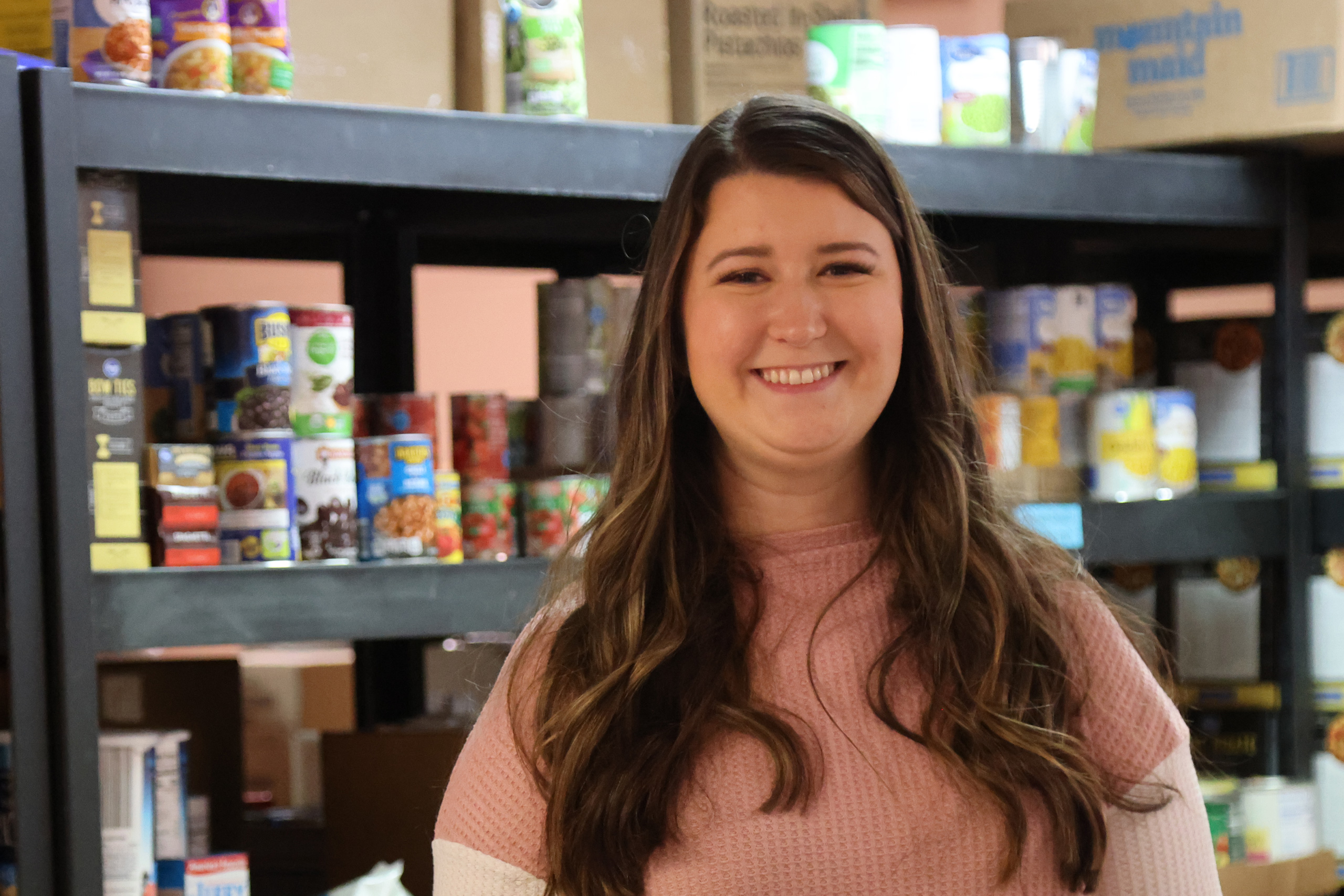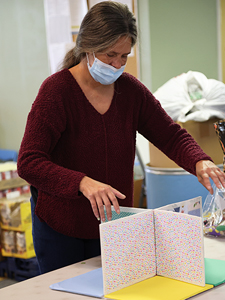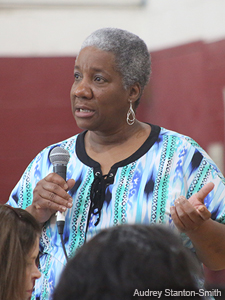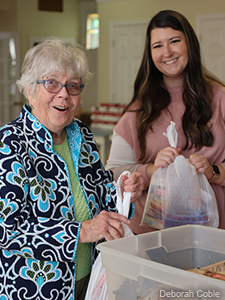
Latest News
March/April response: Do-gooders
National Mission Institution Scott’s Run celebrates 100 years of service.
by Audrey Stanton-Smith
It’s a busy afternoon at Scott’s Run Settlement House. A carload of produce near its expiration date at Sam’s Club has just arrived for the free farmers’ market, and people are waiting and watching as fruit and vegetables are unloaded onto tables in the parking lot of this old hillside building in Osage, West Virginia. Three minutes later, the carload of cantaloupes, apples, and salad greens is gone.
The workers return inside, not for a break, but to continue packing boxes containing a week’s worth of food and hygiene items for the more than 300 seniors who will pick them up at the Settlement House this month or receive them from social agencies who help with delivery. Later, they’ll fill more boxes for more of the 10,000 individuals they serve annually in Monongalia County, West Virginia.
Some of those boxes will be supplemented with diapers, formula, and other items from the baby pantry. Many will contain cat or dog food because, as Assistant Director Devon McDaniel puts it: “We don’t want the food we’re giving to go to the pets; we want the people to eat the food. So, we give them pet food just to make sure that the pets are eating too and that they’re taken care of.”

Local volunteers from United Women in Faith and nearby United Methodist churches will arrive soon to continue filling hundreds of backpacks with school supplies and organizing donations from the community, the United States Department of Agriculture, and local businesses. They’ll pack additional bags with nutritious food for 500 local schoolchildren to take home for the weekend.
And in the midst of making sure all those needs are met, Case Manager Deb Layman will answer her phone to talk to a client.
“There’s a lot of places that will give you food, but there’s not a lot of places that will look to see why you need it,” Layman says, explaining that the Settlement House is far more than just a bandage. It works not only to feed, but to serve individuals and families in Monongalia County who find themselves marginalized by economic hardship.
Workers at Scott’s Run Settlement House may help that caller find a job or the resources she needs to support her family. They may tell her how to get a bus pass. Employees and volunteers may repair her home, offer help writing a resume, or reach out to doctors and pharmaceutical companies to pay for necessary medication.
“Making sure they know where to go when other issues arise is our primary goal for those clients,” Layman says. “[With] expensive medication—which tends to happen the older you get—we try to get in touch with the manufacturer of that drug and their doctor to get it delivered for free. If we can get them that medication, then they can have $200 to spend in other places.”
The scene is somewhat different than it was 100 years ago, but many of the same needs remain—hunger, poverty, and lack of access to resources.
Celebrating 100 years

On Thanksgiving Day, 2022, Scott’s Run Settlement House celebrated its 100th anniversary. On Nov. 5, 2022, board members and staff celebrated the past and the present at Wesley United Methodist Church in nearby Morgantown—a fitting location, considering that its women started the Settlement House in 1922.
Executive Director Michael Richard called them “do-gooders” who bravely stood against the town’s view of outsiders—even when those townspeople burned down their original facility.
At the Nov. 5 celebration, Richard explained that Scott’s Run was once a thriving coal community, so much so that it became overcrowded. The Rev. Amy Shanholtzer, MonValley district superintendent for the West Virginia Conference, said that in 1899, Monongalia County mined 57,000 tons of coal. By 1921, with World War I fueling a demand for more coal, that annual number had increased to 4.4 million tons.
“So, obviously that took a lot of people to mine that coal, and they encouraged as many immigrants to come here as they could,” she told those in attendance at Wesley. “And the story of the coal-mine industry in West Virginia, the underbelly of it, is not so pretty, but the women from the Women’s Home Missionary Society decided to take that on. The Settlement House movement is labeled as progressive. … They took risks, but the women were not dissuaded from reaching out in ministry to people in need, and that’s a rich legacy that we have to claim and live into for the next hundred years.”
By 1922, more than 7,000 people inhabited the 7-mile stretch known as Scott’s Run, just outside of Morgantown, West Virginia. It became so crowded that it seemed to defy the region’s coal town racial separation norms of the day. Black people lived beside White people, Italians beside Russians. And almost as quickly as the Scott’s Run communities like Osage and Pursglove boomed, they busted. National newspapers would call it the epitome of rural industrial poverty.
Meanwhile, members of the Women’s Home Missionary Society of the Methodist Church in Morgantown had been looking for a way to help, Richard said. On Nov. 24, 1922, they held a service for the area children in a small portable school building along the creek in Osage. The next year, Millicent Fuller, a deaconess of the church, took the lead on the mission project. She and the society decided to rent some rooms over what was then Possner’s Store in Osage. The women modeled their new program after other settlement houses that Methodist churches operated in larger cities. Several of the rented rooms were used for the settlement of newly arrived residents. The women taught them English and helped them prepare for citizenship.
“While the women were doing good works for the community, many people and businesses in the area did not trust the women and did not like what they were doing. The women became known as ‘do-gooders,’ and this went against any principles the town had of exploiting the outsiders,” Scott’s Run Settlement House directors wrote in a one-page history document distributed at the anniversary event. “The women had to deal with a lot from the people in town, but this did not discourage them. Even a fire that burnt down the building where their rooms were did not end the mission! The ladies simply started over again and gathered up resources wherever they could.”
They built a permanent structure—the one that still stands today—in 1927. They paid off their bank loan four years later, in the midst of the Great Depression and just when Scott’s Run needed them most.
“Whenever the mines really started to crash, that’s when the poverty level really started to explode, and the Great Depression made it 10 times worse,” Richard explained. “Unfortunately, this area had a national reputation for levels of poverty throughout the years, and we’ve had several presidents and first ladies make it their passion to try to help people in our area.”
It was the missionaries and social workers who escorted First Lady Eleanor Roosevelt through Scott’s Run when she visited on Aug. 18, 1933. She arrived after her companion, former AP reporter Lorena Hickok, called her and told her she needed to see the extremely impoverished conditions of Scott’s Run for herself. Hopeful she could use a homesteading project to help the residents, Roosevelt drove her own Buick to the area. As she walked from house to house and spoke with the residents, some had no idea who she was. Some, more concerned about what they would eat that day, probably didn’t care.
Roosevelt promised help and started by sending canning jars to the Settlement House, since many of the women she visited had complained they had no way to store food. But as progressive as Roosevelt was, she was no match for the White men who ran America. In the end, the only people who were selected to leave Scott’s Run for her Arthurdale Homestead Project were White and had been in the United States for at least two generations. Those left behind still struggled. Those left behind still needed the Settlement House.
Cooking classes, reading classes, and Sunday school became a part of Scott’s Run Settlement House. During the 1950s, it became active in the civic affairs of Osage. In the 1960s and 1970s, work teams and West Virginia University volunteers lent a hand. Eventually, it became home to a day-care center and a place for senior activities. By the 1980s, the Settlement House had added a Meals on Wheels program to its services, as well as a program for young, single mothers, and a food pantry. By then, the organized church that met at Scott’s Run Settlement House was no more, but the work of the church continued in the building.
“Today the Settlement House takes pride in aiding individuals of all ages, backgrounds, nationalities, beliefs, and capabilities,” Richard said. “After 100 years, the original mission of our founders remains: to help our neighbors in need.”
Women continue the mission
Scott’s Run Settlement House, a nonprofit organization, is one of United Women in Faith’s National Mission Institutions. It is also one of the mission projects supported by the General Board of Global Ministries of The United Methodist Church and the Division of Missions of the West Virginia Annual Conference of The United Methodist Church.
“We have a lot of church partners, and we’re so thankful,” McDaniel said.
Members from United Methodist churches in the Morgantown, Suncrest, and Westover areas of West Virginia attended the anniversary celebration. Others traveled greater distances.
United Women in Faith member Lillian Manning traveled all the way from Waco, Texas, where she attends One Fellowship United Methodist Church, to celebrate 100 years of Scott’s Run Settlement House.
“We used to have a worship service there on Sunday mornings,” she said as she looked through decades of old photos, some featuring her working in the Settlement House in the 1970s. “I taught pre-K.”

Other United Women in Faith members, like Caryol Longenecker of Wesley United Methodist Church in Morgantown, West Virginia, were there to support the work that their predecessors began and that they continue. She and others visit the Settlement House to help with its backpack program and fill other volunteer roles.
“The Wesley women have always had some connection,” Longenecker said, “and we’re still going strong.”
“We’re just excited to keep the mission going and be able to help people in this community and all of Monongalia County,” McDaniel said.
“And there’s a lot of generational appreciation here,” Richard added. “Volunteers whose grandmother came here for services, or people whose parents have volunteered or received services and then the next-generation volunteers. … This place means a lot to a lot of people.
“The mission hasn’t changed, even though some of the focuses have,” he continued. “It’s relatively timeless, a place to turn for the community.”
Citing Scripture from Philippians 4, in which Paul names women and tells them to rejoice and stand firm in the Lord, Shanholtzer called on those attending the Nov. 5 celebration to continue making a difference.
“The way that we can influence and change lives through the ministry that we do is powerful,” she said. “The history of Scott’s Run is of adapting to the needs of the time and moving on and creating new ministry to help people to enrich their lives, to offer them faith and a hand of love and care and support. And we still have those needs among us. We have seniors raising grandchildren. And we are still serving families in need today, maybe a little differently than it began, but continuing to look for the need and serve it.
“We are truly blessed with this ministry, those who continue it, and all of the hands that volunteer to help in so many ways, people still willing to be do-gooders in this day and age. So, I just want to challenge us all to continue to be those do-gooders, even if it means risking just a little bit or maybe even a lot in order to help all people understand that they are valuable, that they are beloved, and that they matter.”

